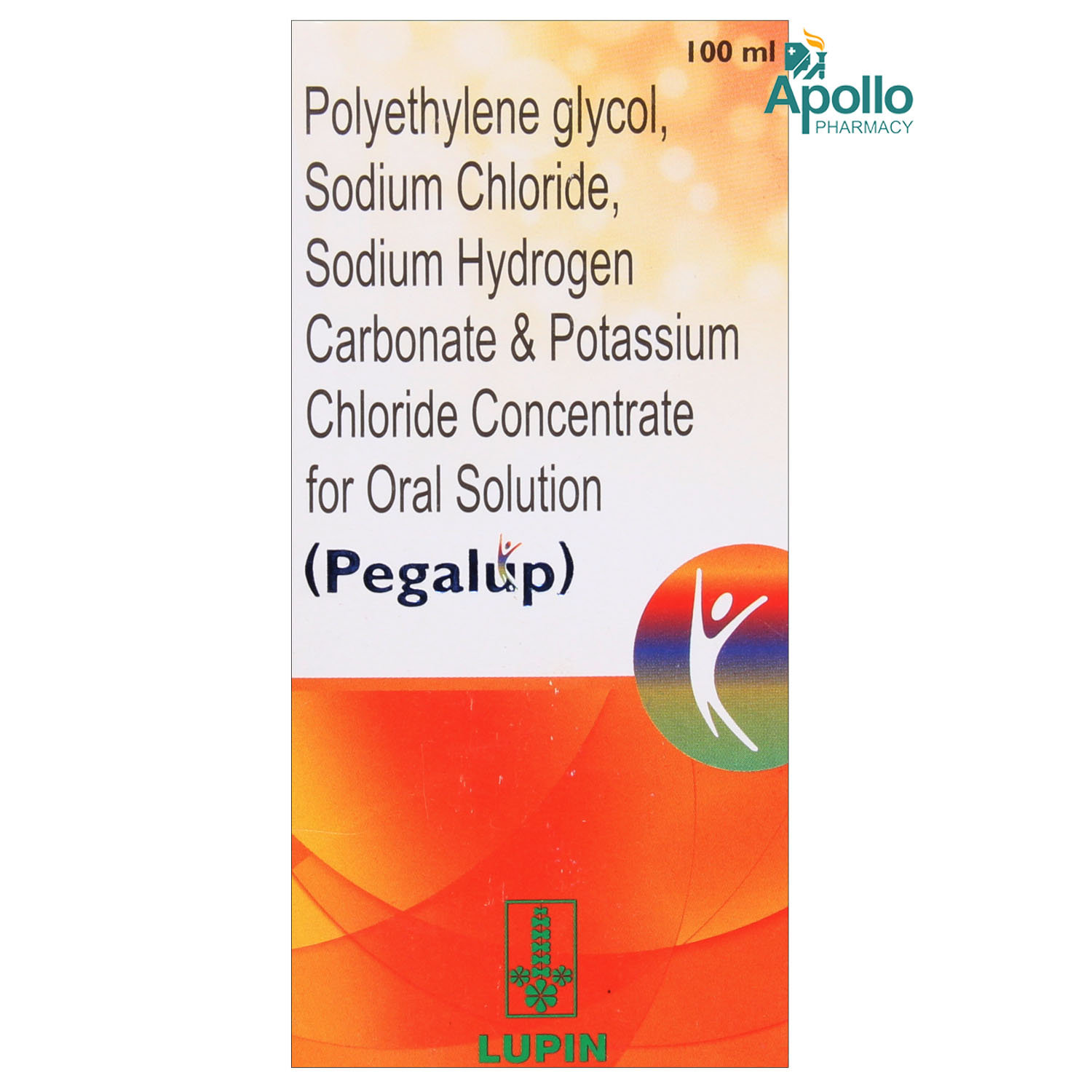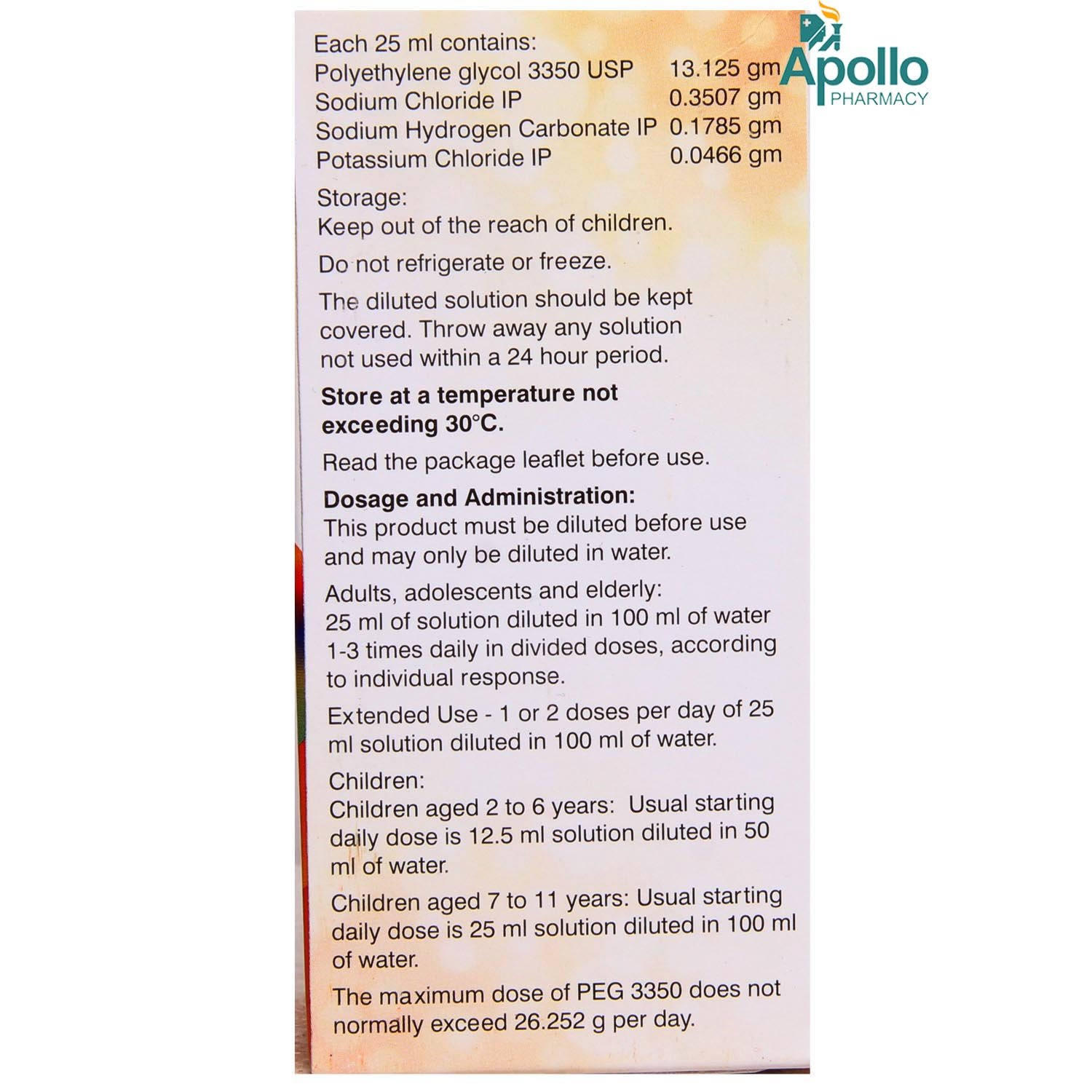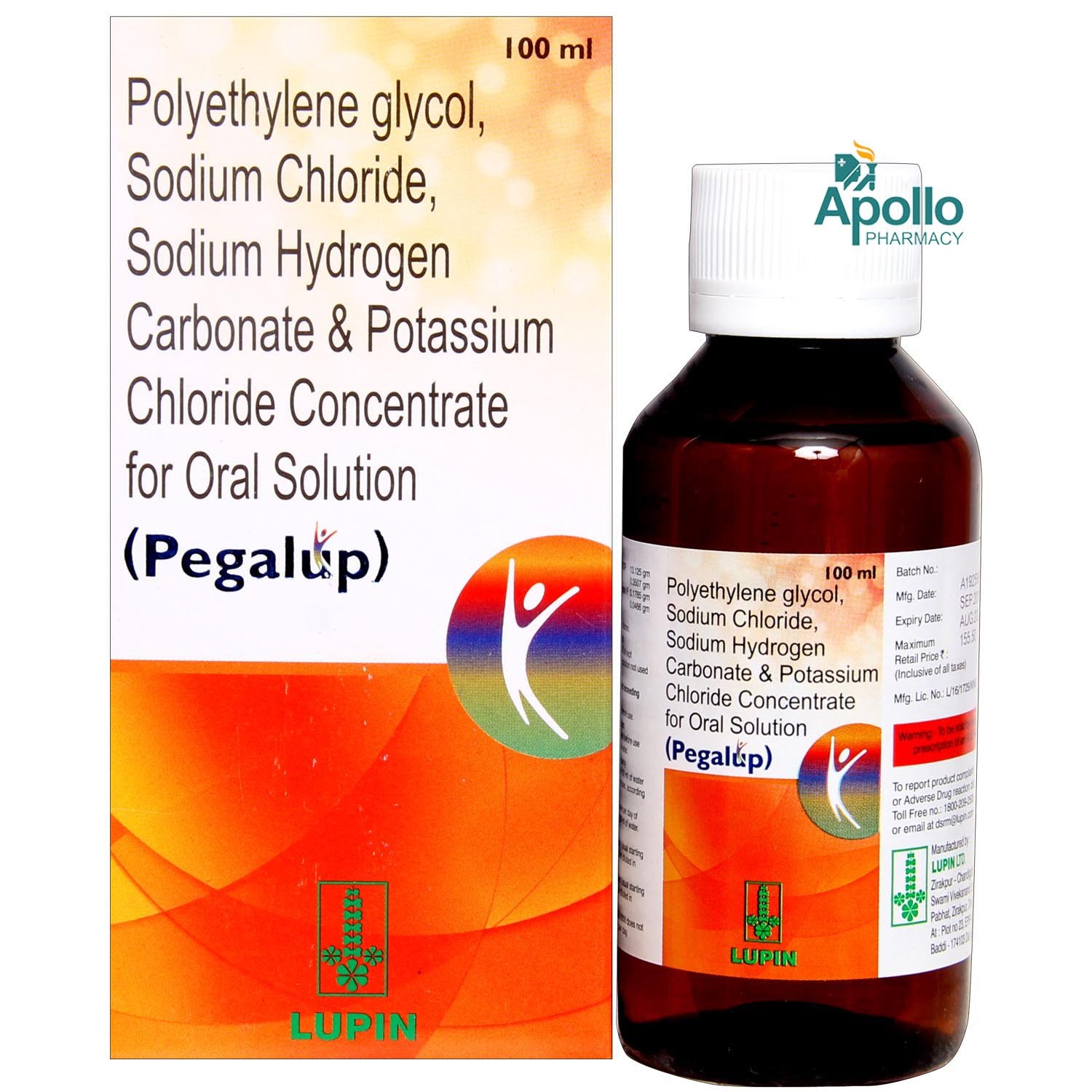पेगलुप सिरप 100 ml



Selected Pack Size:100 ml
100 ml ₹210.6
(₹2.11 / 1 ml)
In Stock
200 ml ₹396.5
(₹1.98 / 1 ml)
In Stock
(Inclusive of all Taxes)
Get Free delivery (₹99)
Pegalup Syrup is used to treat constipation. It works by drawing water into the intestine, which softens the stools, making them easier to pass. In some cases, this medicine may cause side effects such as stomach pain, indigestion, mild diarrhoea, nausea, or vomiting. Before taking this medicine, inform the doctor if you are pregnant or breastfeeding, taking any other medication, or have any pre-existing medical conditions.
Know Your Delivery Time
Provide Delivery Location

Secure Payment

India's Most Trusted Pharmacy

Genuine Products

Have a query?
- Drink water or other clear fluids.
- To prevent worsening of pain, limit intake of tea, coffee, or alcohol.
- Include bland foods like rice, toast, crackers, and rice in your diet.
- Avoid lying down immediately after eating as it may cause indigestion or heartburn.
- Avoid acidic and spicy food as it may cause indigestion.
- Inform Your Doctor: Notify your doctor immediately about your diarrhoea symptoms. This allows them to adjust your medication or provide guidance on managing side effects.
- Stay Hydrated: Drink plenty of fluids to replace lost water and electrolytes. Choose water, clear broth, and electrolyte-rich drinks. Avoid carbonated or caffeinated beverages to effectively rehydrate your body.
- Follow a Bland Diet: Eat easy-to-digest foods to help firm up your stool and settle your stomach. Try incorporating bananas, rice, applesauce, toast, plain crackers, and boiled vegetables into your diet.
- Avoid Trigger Foods: Steer clear of foods that can worsen diarrhoea, such as spicy, fatty, or greasy foods, high-fibre foods, and dairy products (especially if you're lactose intolerant).
- Practice Good Hygiene: Maintain good hygiene to prevent the spread of infection. To stay healthy, wash your hands frequently, clean and disinfect surfaces regularly, and avoid exchanging personal belongings with others.
- Take Anti-Diarrheal Medications: If your doctor advises, anti-diarrheal medications such as loperamide might help manage diarrhoea symptoms. Always follow your doctor's directions.
- Keep track of your diarrhoea symptoms. If they don't get better or worse or are accompanied by severe stomach pain, blood, or dehydration signs (like extreme thirst or dark urine), seek medical help.
- Preventing Vomiting (Before it Happens)
- Take medication exactly as prescribed by your doctor. This can help minimize side effects, including vomiting.
- Having a small meal before taking your medication can help reduce nausea and vomiting.
- Talk to your doctor about taking anti-nausea medication along with your prescribed medication.
- Managing Vomiting (If it Happens)
- Try taking ginger in the form of tea, ale, or candy to help alleviate nausea and vomiting.
- What to Do if Vomiting Persists
- Consult your doctor if vomiting continues or worsens, consult the doctor for guidance on adjusting your medication or additional treatment.
- Inform your doctor about the nausea and discuss possible alternatives to the medication or adjustments to the dosage.
- Divide your daily food intake into smaller, more frequent meals to reduce nausea.
- Opt for bland, easily digestible foods like crackers, toast, plain rice, bananas, and applesauce.
- Avoid certain foods that can trigger nausea, such as fatty, greasy, spicy, and smelly foods.
- Drink plenty of fluids, such as water, clear broth, or electrolyte-rich beverages like coconut water or sports drinks.
- Use ginger (tea, ale, or candies) to help relieve nausea.
- Get adequate rest and also avoid strenuous activities that can worsen nausea.
- Talk to your doctor about taking anti-nausea medication if your nausea is severe.
- Record when your nausea occurs, what triggers it, and what provides relief to help you identify patterns and manage your symptoms more effectively.
- Report the itching to your doctor immediately; they may need to change your medication or dosage.
- Use a cool, damp cloth on the itchy area to help soothe and calm the skin, reducing itching and inflammation.
- Keep your skin hydrated and healthy with gentle, fragrance-free moisturizers.
- Try not to scratch, as this can worsen the itching and irritate your skin.
- If your doctor prescribes, you can take oral medications or apply topical creams or ointments to help relieve itching.
- Track your itching symptoms and follow your doctor's guidance to adjust your treatment plan if needed. If the itching persists, consult your doctor for further advice.
- Hydrate your body: Drink enough water to prevent dehydration and headaches.
- Calm Your Mind: Deep breathing and meditation can help you relax and relieve stress.
- Rest and Recharge: Sleep for 7-8 hours to reduce headache triggers.
- Take rest: lie down in a quiet, dark environment.
- Cold or warm compresses can help reduce tension.
- Stay Upright: Maintain good posture to keep symptoms from getting worse.
- To treat headaches naturally, try acupuncture or massage therapy.
- Over-the-counter pain relievers include acetaminophen and ibuprofen.
- Prescription Assistance: Speak with your doctor about more substantial drug alternatives.
- Severe Headaches: Seek emergency medical assistance for sudden, severe headaches.
- Frequent Headaches: If you get reoccurring headaches, consult your doctor.
- Headaches with Symptoms: Seek medical attention if your headaches include fever, disorientation, or weakness.
Drug-Drug Interactions
Drug-Drug Interactions
Login/Sign Up
Co-administration of Dimenhydrinate and Pegalup Syrup 100 ml can increase the risk of stomach inflammation.
How to manage the interaction:
Co-administration of Dimenhydrinate with Pegalup Syrup 100 ml is generally not recommended, as it can lead to an interaction, it can be taken when a doctor has prescribed it. However, if you experience severe stomach pain, sudden dizziness, vomiting (especially with blood), or dark stools, consult the doctor immediately. Do not discontinue any medications without a doctor's advice.
Taking Procyclidine and Pegalup Syrup 100 ml together can increase the risk of stomach ulcers.
How to manage the interaction:
Taking Procyclidine with Pegalup Syrup 100 ml is not recommended, but it can be taken together if advised by a doctor. However, if you experience severe stomach pain, bloating, sudden lightheadedness or dizziness, nausea, vomiting (especially with blood), decreased hunger, or dark, tarry stools, consult the doctor immediately. Do not discontinue any medications without a doctor's advice.
Taking Trospium with Pegalup Syrup 100 ml can increase the risk of stomach ulcers.
How to manage the interaction:
Taking Trospium with Pegalup Syrup 100 ml is not recommended as it may lead to an interaction, it can be taken if prescribed by the doctor. However, if you experience severe stomach pain, bloating, sudden lightheadedness or dizziness, nausea, vomiting (especially with blood), decreased hunger, or dark, tarry stools, consult the doctor immediately. Do not discontinue any medications without a doctor's advice.
Taking Biperiden with Pegalup Syrup 100 ml can increase the risk of stomach ulcers.
How to manage the interaction:
Taking Biperiden with Pegalup Syrup 100 ml is not recommended as it can lead to an interaction, but can be taken if prescribed by the doctor. However, if you experience severe stomach pain, bloating, sudden lightheadedness or dizziness, nausea, vomiting (especially with blood), decreased hunger, or dark, tarry stools, consult the doctor immediately. Do not discontinue any medications without a doctor's advice.
Taking Cyproheptadine with Pegalup Syrup 100 ml can increase the risk of stomach ulcers.
How to manage the interaction:
Taking Cyproheptadine with Pegalup Syrup 100 ml is not recommended, as it can lead to an interaction, can be taken if your doctor has prescribed it. However, if you experience severe stomach pain, bloating, sudden lightheadedness or dizziness, nausea, vomiting (especially with blood), decreased hunger, dark, tarry stools, consult the doctor immediately. Do not stop any medication without talking to a doctor.
Co-administration of trihexyphenidyl with Pegalup Syrup 100 ml can increase the risk of stomach ulcers, bleeding, and gastrointestinal injury.
How to manage the interaction:
Taking trihexyphenidyl with Pegalup Syrup 100 ml is not recommended as it can possibly result in an interaction, it can be taken if prescribed by a doctor. However, if you experience abdominal pain, bloating, sudden dizziness or lightheadedness, nausea, vomiting (especially with blood), loss of appetite, black stools contact a doctor immediately. Do not discontinue any medications without consulting to a doctor.
Coadministration of Oxybutynin with Pegalup Syrup 100 ml can increase the risk of developing stomach ulcers.
How to manage the interaction:
Taking Oxybutynin with Pegalup Syrup 100 ml is generally avoided as it can lead to an interaction, it can be taken when a doctor has prescribed it. Consult the doctor immediately if you experience severe stomach pain, bloating, lightheadedness, dizziness, vomiting (especially with blood), decreased hunger, or dark stools. Do not discontinue any medication without contacting a doctor.
The combination of Amitriptyline and Pegalup Syrup 100 ml may cause stomach and upper intestinal discomfort. (Only applicable to an oral preparation)
How to manage the interaction:
Although co-administration of Amitriptyline and Pegalup Syrup 100 ml is not recommended as it can possibly lead to an interaction, they can be taken if prescribed by a doctor. If you experience severe stomach pain, bloating, sudden dizziness or lightheadedness, nausea, vomiting (in particular with blood), decreased hunger, and black stools while taking these medications, consult a doctor immediately. Do not discontinue any medications without talking to a doctor.
Taking Meclizine and Pegalup Syrup 100 ml (oral form) together can increase the potassium levels in blood.
How to manage the interaction:
Taking Meclizine with Pegalup Syrup 100 ml is not recommended, as it can lead to an interaction, it can be taken if a doctor has prescribed it. However, if you experience severe stomach pain, bloating, sudden lightheadedness or dizziness, nausea, vomiting (especially with blood), decreased hunger, dark, tarry stools, consult the doctor immediately. Do not discontinue any medications without a doctor's advice.
Co-administration of Flavoxate with Pegalup Syrup 100 ml can increase the risk of stomach ulcers.
How to manage the interaction:
Taking Flavoxate with Pegalup Syrup 100 ml is not recommended, as it can lead to an interaction, it can be taken if a doctor has prescribed it. However, if you experience severe stomach pain, bloating, sudden lightheadedness or dizziness, nausea, vomiting (especially with blood), decreased hunger, or dark, tarry stools, consult the doctor immediately. Do not discontinue the medication without consulting a doctor.
Drug-Food Interactions
Drug-Food Interactions
Login/Sign Up
FAQs
Customers Also Bought
Disclaimer
Author Details
We provide you with authentic, trustworthy and relevant information
Buy best Gastro Enterology products by
Abbott India Ltd
Sun Pharmaceutical Industries Ltd
Cipla Ltd
Alkem Laboratories Ltd
Torrent Pharmaceuticals Ltd
Mankind Pharma Pvt Ltd
Intas Pharmaceuticals Ltd
Lupin Ltd
Dr Reddy's Laboratories Ltd
Aristo Pharmaceuticals Pvt Ltd
Leeford Healthcare Ltd
Alembic Pharmaceuticals Ltd
La Renon Healthcare Pvt Ltd
Macleods Pharmaceuticals Ltd
Wallace Pharmaceuticals Pvt Ltd
J B Chemicals & Pharmaceuticals Ltd
Zydus Healthcare Ltd
Morepen Laboratories Ltd
Micro Labs Ltd
Zydus Cadila
Fourrts India Laboratories Pvt Ltd
Zuventus Healthcare Ltd
FDC Ltd
Alniche Life Sciences Pvt Ltd
Cadila Pharmaceuticals Ltd
Tas Med India Pvt Ltd
Eris Life Sciences Ltd
Medishri Healthcare Pvt Ltd
Medley Pharmaceuticals Ltd
Signova Pharma
Elder Pharmaceuticals Ltd
Sanatra Healthcare Ltd
East West Pharma India Pvt Ltd
Tablets India Ltd
Wockhardt Ltd
Emcure Pharmaceuticals Ltd
Vasu Organics Pvt Ltd
Ajanta Pharma Ltd
Akumentis Healthcare Ltd
Glenmark Pharmaceuticals Ltd
Cadila Healthcare Ltd
Primus Remedies Pvt Ltd
Biological E Ltd
Corona Remedies Pvt Ltd
Blue Cross Laboratories Pvt Ltd
Indoco Remedies Ltd
Medgen Drugs And Laboratories Pvt Ltd
Hetero Drugs Ltd
Ipca Laboratories Ltd
Pfizer Ltd
DR Johns Lab Pharma Pvt Ltd
Ozone Pharmaceuticals Ltd
Systopic Laboratories Pvt Ltd
Albert David Ltd
Indchemie Health Specialities Pvt Ltd
Ordain Health Care Global Pvt Ltd
Biochem Pharmaceutical Industries Ltd
Samarth Life Sciences Pvt Ltd
Shine Pharmaceuticals Ltd
Shreya Life Sciences Pvt Ltd
Troikaa Pharmaceuticals Ltd
Hetero Healthcare Pvt Ltd
Knoll Healthcare Pvt Ltd
Lincoln Pharmaceuticals Ltd
Olcare Laboratories Pvt Ltd
Prevego Healthcare & Research Pvt Ltd
Adonis Laboratories Pvt Ltd
Capital Pharma
Eskag Pharma Pvt Ltd
Foregen Healthcare Ltd
Sanzyme Pvt Ltd
Yuventis Pharmaceuticals
3M India Ltd
Alienist Pharmaceutical Pvt Ltd
Dey's Medical Stores (Mfg) Ltd
Meridian Enterprises Pvt Ltd
Meyer Organics Pvt Ltd
Sinsan Pharmaceuticals Pvt Ltd
Chemo Healthcare Pvt Ltd
Intra Life Pvt Ltd
Levin Life Sciences Pvt Ltd
Msn Laboratories Pvt Ltd
Overseas Health Care Pvt Ltd
RPG Life Sciences Ltd
Steris Healthcare
Medwock Pharmaceuticals Pvt Ltd
Obsurge Biotech Ltd
Panacea Biotec Ltd
Saf Fermion Ltd
Sargas Life Sciences Pvt Ltd
USV Pvt Ltd
Aar Ess Remedies Pvt Ltd
Comed Chemicals Ltd
Galpha Laboratories Ltd
Indiabulls Pharmaceuticals Pvt Ltd
Seagull Pharmaceutical Pvt Ltd
Syndicate Life Sciences Pvt Ltd
Votary Laboratories (India) Ltd
Win Medicare Ltd
Biophar Lifesciences Pvt Ltd










